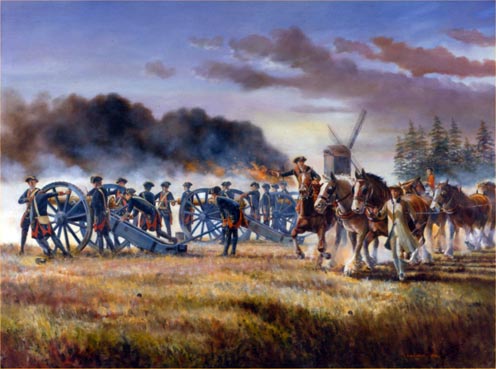
"Capt Macbean's Company, 1st Battalion Royal Artillery at the Battle of Minden"
Ref: DR006
by David Rowlands
Image Size 58 x 38 cm
1st August 1759: Britain and Prussia were fighting against France, Russia and Austria. Captain Macbean commanded one of the three companies of Royal Artillery in Germany for the 1759 campaign. His ten 12-pounder guns were drawn by teams of horses hired from a civilian contractor, and driven by civilians.
The French were strongly positioned at the town of Minden, and during the night of 31st July-1st August moved forward to attack the Allied army, which was commanded by General Field Marshal Ferdinand, Prince of Brunswick. He anticipated the French move, and swung the main part of his force to the West to strike at their left flank. In those days of very poor roads, the heavy guns were not expected to have a high degree of mobility, and during a battle would normally remain static in one position. Yet on this occasion all of the British guns took part in the flank march, which was a remarkable feat for those times.
By 06.30 hours the British light guns had come into action on the extreme right, against 30 of the enemy's guns. As nine Allied infantry battalions marched forward to attack the French cavalry, Macbean with his heavy brigade saw where he could be of most service, and put his teams of plodding cart horses into a trot, their hired drivers running alongside with their whips. He brought his 12-pounders into action alongside the light guns. The shot and shell from all the British guns succeeded in subduing the enemy artillery while the infantry overthrew three successive French cavalry charges and a charge of Saxon infantry.
The introduction of the elevating screw to British guns was an important contribution to their superior performance at the Battle of Minden. It doubtless increased the accuracy of gun-laying, and more importantly the rate of fire.
With a copy of a detailed contemporary map of the battlefield, I have walked all over this very flat heath. I have depicted the windmill which in 1759 was a feature at the burning village of Hahlen. On the morning of the battle a strong wind was blowing, which drove the smoke towards the enemy. Civilian drivers in their off-white smocks are leading the draught horses to the positions where the guns will be unlimbered and come into action alongside the others.
Macbean’s Company was raised at Woolwich in July 1747 as Captain J Goodyer’s Company Royal Artillery. It is now 12 (Minden) Battery Royal Artillery
